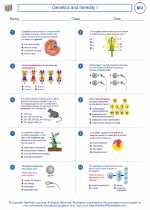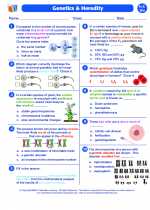Centrifuges: Explanation and Study Guide
Explanation
A centrifuge is a laboratory instrument that is used to separate particles from a solution based on their size, shape, density, and viscosity. It works by spinning samples at high speeds, causing the particles to move outward and separate from the solution. Centrifuges are commonly used in various scientific and medical fields, including biology, chemistry, and medicine.
Types of Centrifuges
There are several types of centrifuges, including:
- Microcentrifuge: Used for small volumes of samples, typically in the range of 0.2 mL to 2 mL.
- Refrigerated Centrifuge: Equipped with a cooling system to maintain low temperatures during the centrifugation process, ideal for sensitive samples.
- Ultracentrifuge: Capable of spinning at very high speeds, often used for separating macromolecules such as proteins and nucleic acids.
Applications
Centrifuges have various applications, including:
- Separation of blood components in medical laboratories
- Isolation of DNA, RNA, and proteins in molecular biology research
- Purification of cell organelles in cell biology studies
- Separation of particles in environmental and industrial research
Study Guide
If you are studying centrifuges, here are some key topics to focus on:
- Principles of centrifugation: Understand how centrifuges separate particles based on their properties.
- Types of centrifuges: Familiarize yourself with the different types of centrifuges and their specific applications.
- Centrifuge operation: Learn about the proper use and maintenance of centrifuges to ensure accurate results and safety.
- Applications in biology: Explore the various ways centrifuges are used in biological research and medical diagnostics.
By mastering these topics, you will have a solid understanding of centrifuges and their importance in scientific and medical fields.
.◂Biology Worksheets and Study Guides High School. Genetics and heredity I
Worksheet/Answer key Genetics and heredity I
Genetics and heredity I  Worksheet/Answer key
Worksheet/Answer key Genetics and heredity I
Genetics and heredity I  Worksheet/Answer key
Worksheet/Answer key Genetics and heredity I
Genetics and heredity I  Worksheet/Answer key
Worksheet/Answer key Genetics and heredity I
Genetics and heredity I  Vocabulary/Answer key
Vocabulary/Answer key Genetics and heredity I
Genetics and heredity I  Vocabulary/Answer key
Vocabulary/Answer key Genetics and heredity I
Genetics and heredity I  Vocabulary/Answer key
Vocabulary/Answer key Genetics and heredity I
Genetics and heredity I  Vocabulary/Answer key
Vocabulary/Answer key Genetics and heredity I
Genetics and heredity I  Vocabulary/Answer key
Vocabulary/Answer key Genetics and heredity I
Genetics and heredity I  Vocabulary/Answer key
Vocabulary/Answer key Genetics and heredity I
Genetics and heredity I  Vocabulary/Answer key
Vocabulary/Answer key Genetics and heredity I
Genetics and heredity I 

 Worksheet/Answer key
Worksheet/Answer key
 Worksheet/Answer key
Worksheet/Answer key
 Worksheet/Answer key
Worksheet/Answer key
 Vocabulary/Answer key
Vocabulary/Answer key
 Vocabulary/Answer key
Vocabulary/Answer key
 Vocabulary/Answer key
Vocabulary/Answer key
 Vocabulary/Answer key
Vocabulary/Answer key
 Vocabulary/Answer key
Vocabulary/Answer key
 Vocabulary/Answer key
Vocabulary/Answer key
 Vocabulary/Answer key
Vocabulary/Answer key

The resources above cover the following skills:
LIFE SCIENCE (NGSS)
Heredity: Inheritance and Variation of Traits
Students who demonstrate understanding can:
Ask questions to clarify relationships about the role of DNA and chromosomes in coding the instructions for characteristic traits passed from parents to offspring.
Apply concepts of statistics and probability to explain the variation and distribution of expressed traits in a population.